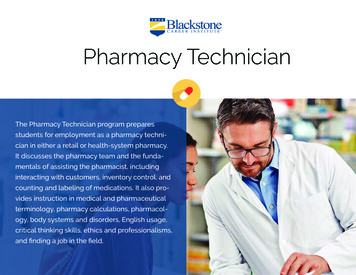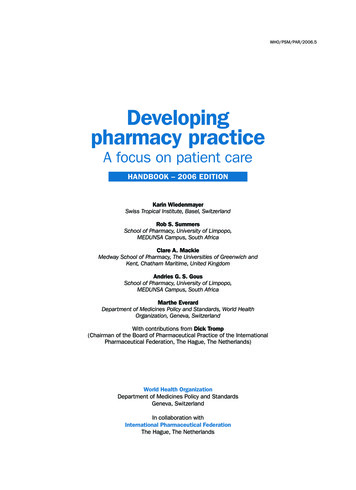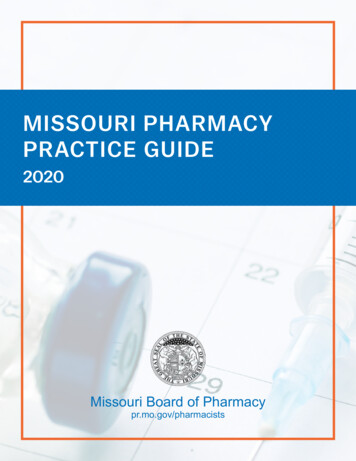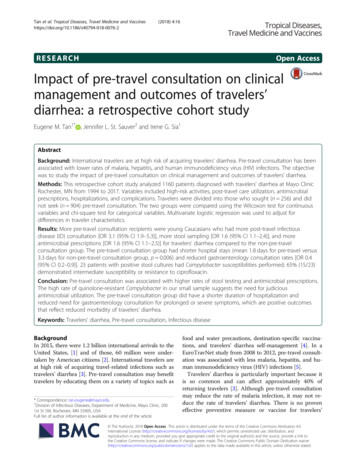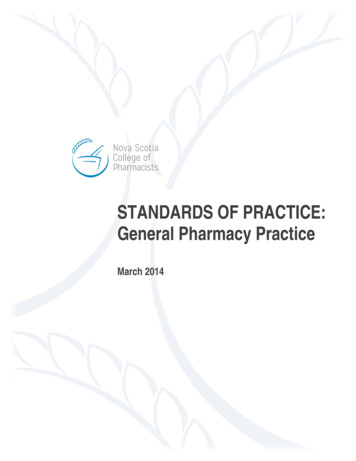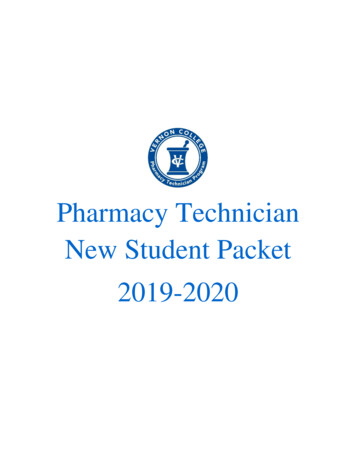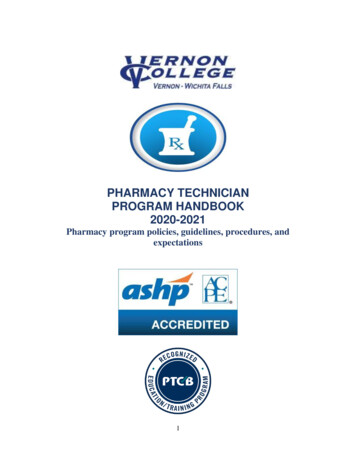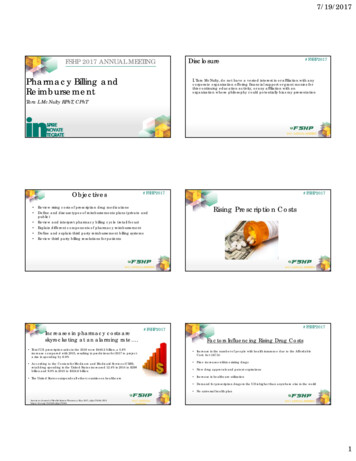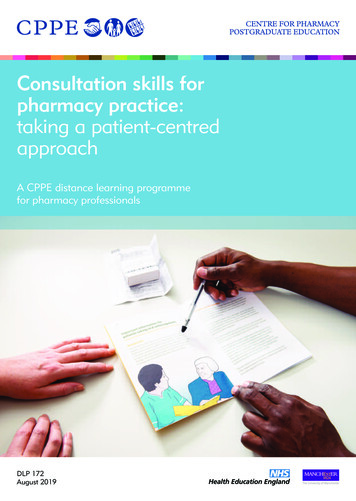
Transcription
Consultation skills forpharmacy practice:taking a patient-centredapproachA CPPE distance learning programmefor pharmacy professionalsDLP 172August 2019
Consultation skills forpharmacy practice:taking a patient-centredapproachA CPPE distance learning programmefor pharmacy professionalsA core learning programme for:Educational solutions for the NHS pharmacy workforce Copyright controller HMSO 2019
iiAcknowledgementsLead writersLesley Grimes, CPPE senior pharmacist, learning developmentNina Barnett, consultant pharmacist, care of older people, East and South EastEngland Specialist Pharmacy Services (contributory author for Section 5 – Healthcoaching in patient consultations)ReviewersLeah Davies, clinical development pharmacist, Rowlands PharmacyJames Desborough, lecturer in pharmacy practice, University of East AngliaElizabeth Fidler, principal pharmacy technician, Health Education Kent, Surreyand Sussex - PharmacyDelyth James, senior lecturer, Cardiff UniversityBarry Jubraj, associate professor, Chelsea and Westminster Hospital NHSFoundation Trust and UCL School of PharmacyRaminder Sihota, senior professional L&D manager, Boots UKCPPE reviewersAnna Graves, regional tutor, North WestMatthew Shaw, deputy directorKaren Wragg, regional manager, South CentralThanksThe two videos referred to in Section 5 of this programme have been co-producedby Imperial College and London Consortium Television. Thanks go to:Nina Barnett, consultant pharmacist, care of older peoplePaul Craddock (camera and editor)Zulema Dene (actress)Bartek Dziadosz (camera)Douglas Hing (project advisor)Lis Paice (project lead)We have used some content from the CPPE Patient-centred care open learningprogramme in this learning programme. CPPE recognises the contribution madeby Louise Winstanley and the other contributors and reviewers of that resource.ProductionOutset Publishing Ltd, SussexPublished in February 2014 by the Centre for Pharmacy Postgraduate Education,Manchester Pharmacy School, University of Manchester, Oxford Road,Manchester M13 9PTwww.cppe.ac.ukUpdated and reprinted in August 2019.
ContentsiiiAbout CPPE distance learning programmesviiAbout this learning programmexPatient-centred care and pharmacy practicexvWhat do we mean by a consultation?xvThe patient-centred consultation in pharmacy todayxviPutting the patient at the centre of the consultationPractice pointsReflective questionsxviiixvii, xixxv, xvii, xxSection 1 Medicines optimisation and medicines adherence11.1 Medicines optimisation11.2 Understanding medicines adherence21.3 The reasons for non-adherence31.4 Unintentional and intentional non-adherenceInternal and external causes of non-adherence671.5 Assessing adherenceSelf-reporting10101.6 Discussing adherence with a patient111.7 Interventions to improve adherence131.8 Considering the needs of different patient groupsOlder people and adherenceYounger patients and adherencePhysical or learning disabilities and adherencePeople with severe mental health problems and adherence1414151616Summary and intended outcomes18Suggested answers19Case study 1 George12Case study 2 Rebecca15ExercisesPractice pointsReflective questions2, 4, 7, 9, 175, 68, 14AUGU ST 2019
ivCONTENTSSection 2 Effective communication232.1 Key communication skillsBody languageVerbal languageListening242427272.2 Basic principles of effective communication282.3 Transactional analysis model292.4 Barriers to effective communicationTelephone consultationsBlocking behaviours3232342.5 Taking a patient history372.6 Tools to support your practice392.7 Recording your consultation40Summary and intended outcomes41Suggested answers42Case study 3 Lily35Exercises25, 30, 40, 41Practice points26, 31, 39, 40Reflective questions23, 29, 35Section 3 Consultation models and the theory behind them3.1 The history of consultation theoryBio-medical modelBalint theoryTransactional analysis modelHealth belief modelAnthropological or ‘folk’ model4545464646473.2 Consultation models and current practiceCalgary-Cambridge guidePendleton’s frameworkRoger Neighbour – The inner consultation (1987)BARD – Ed Warren (2002)47495257573.3 Consultation styles59Summary and intended outcomes61Suggested answers62Case study 3 Lily – revisited55Exercises51, 58Practice points58, 60Reflective questionsAUGU ST 20194445, 48, 52
CONTENTSSection 4 Effective consultation skills654.1 The medication related consultation framework (MRCF)664.2 Skills for effective consultationInitiating the sessionGathering information and eliciting the patient’s perspectiveExplanation and planningClosing the sessionProviding structureBuilding the relationship4.3 Shared decision makingSharing expertise717173808081818384Summary and intended outcomes90Suggested answers91Case study 3 Lily – revisited86Exercises66, 76Practice points66, 71, 80, 89Reflective questions65, 83, 89Section 5 Health coaching in patient consultations935.1 Health coaching and medicines optimisation945.2 The background to health coaching945.3 Evidence for health coachingHealth promotion and health coachingMedicines adherence and health coaching9798985.4 The skills needed for health coachingPatient factors991005.5 Health coaching models and medicines adherenceGROWThe four Es1021021025.6 Motivational interviewingOARSScaling questionsRollnick’s top ten useful questions105108109109Summary and intended outcomes111Suggested answers112Case study 1 George – revisited100ExercisesPractice pointsv95, 99, 104, 105, 107, 108, 11094, 105AUGU ST 2019
viCONTENTSSection 6 Moving your practice forward1146.1 Consultation models – application to practice1156.2 Key consultation skills – application to practice1166.3 Taking a patient-centred approach – application to practice 1176.4 Adopting a health coaching approach to the consultation118Summary and intended outcomes119References120Tables and figuresFiguresFigure 1 Example of self-reporting from NICE Clinicalguideline CG7610Figure 2 Complementary versus crossed transactions incommunication30Figure 3 The basic guide49Figure 4 Moving towards a patient-centred approach59Figure 5 The medication-related consultation framework(MRCF)67Figure 6 Three pillars of health coaching98Figure 7 The four Es: supporting ExcEllEncE in medicinesadherence103Figure 8 Stages of change model106TablesAUGU ST 2019Table 1Key strategies to support adherenceTable 2Principles of effective communication928
About CPPE distance learning programmesviiAbout CPPEThe Centre for Pharmacy Postgraduate Education (CPPE) offers a wide range oflearning opportunities in a variety of formats for pharmacy professionals from allsectors of practice. We are funded through the NHS Multi-professional Educationand Training Fund from Health Education England to offer continuingprofessional development for all pharmacists and pharmacy technicians providingNHS services in England. For further information about our learning portfolio,visit: www.cppe.ac.ukWe recognise that people have different learning needs and not every CPPElearning programme is suitable for every pharmacist or pharmacy technician.Some of our programmes contain core learning, while others deliver morecomplex learning that is only required to support certain roles. So we have createdthree categories of learning – CPPE 1 2 3 – and allocated each programme to anappropriate category.Core learning (limited expectation of prior knowledge)Application of knowledge (assumes prior learning)Supporting specialisms (CPPE may not be the provider and willsignpost you to other appropriate learning providers).This is alearning programme; however, some of the learning doesinvolve the application of knowledge.RevalidationYou can use this programme to support revalidation and your continuingprofessional development (CPD). Consider what your learning needs are in thisarea. For more information about revalidation and to record your entries, visit:www.mygphc.orgAUGU ST 2019
viiiA B O U T C P P E D I S TA N C E L E A R N I N G P R O G R A M M E SActivitiesExercisesWe include exercises throughout this programme as a form of self-assessment. Usethem to test your knowledge and understanding of key learning points.Practice pointsPractice points are an opportunity for you to consider your practical approach tothe effective care of patients or the provision of a service. They are discreteactivities designed to help you to identify good practice, to think through the stepsrequired to implement new practice, and to consider the specific needs of yourlocal population.We have designed the practice points in this programme to help you and yourteam to make links between the learning and your daily practice and to co-ordinatewith other healthcare professionals.Case studiesWe base case studies on actual or simulated events. They are included to help youto interpret protocols, deal with uncertainties and weigh up the balance ofjudgements needed to arrive at a conclusion. We design the case studies to prepareyou for similar or related cases that you may face in your own practice.Reflective questionsThese questions are included to give you an opportunity to pause and reflect onyour current practice and skills throughout the programme. Thinking about thesequestions will help you to meet the objectives of the programme and will extendand reinforce your learning.AssessmentAssociated assessments have been developed as part of the toolkit for developingconsultation skills. You can access the assessments at:www.consultationskillsforpharmacy.comReferences and further readingYou can find references for all the books, articles, reports and websites mentionedin the text, together with a list of further reading to support your learning at theend of the programme. References are indicated in the text by a superscript3number (like this ).AUGU ST 2019
A B O U T C P P E D I S TA N C E L E A R N I N G P R O G R A M M E SixProgramme guardiansCPPE has adopted a quality assurance process called ‘programme guardians’. Aprogramme guardian is a recognised expert in an area relevant to the content of alearning programme who will review the programme every six months. We willpost any corrections, additions, deletions or further supporting materials that areneeded, as an update to the programme on the CPPE website. We recommend thatyou refer to these updates if you are using this (or any other) learning programmesignificantly after its initial publication date. A full list of programme guardians isavailable on our website. You can email your comments about this programme tothem at: info@cppe.ac.ukExternal websitesCPPE is not responsible for the content of any non-CPPE websites mentioned inthis programme or for the accuracy of any information to be found there. The factthat a website or organisation is mentioned in the programme does not mean thatCPPE either approves of it or endorses it.DisclaimerCPPE recognises that local interpretation of national guidance may differ from theexamples used in this learning programme and you are advised to check with yourown relevant local guidelines. You are also advised to use this programme withother established reference sources. If you are reading this programmesignificantly after the date of initial publication you should refer to currentpublished evidence. CPPE does not accept responsibility for any errors oromissions.FeedbackWe hope you find this learning programme useful for your practice. Please help usto assess its value and effectiveness by completing the online feedback formavailable on our website. Visit: www.cppe.ac.uk/mycppe and then select MyCPPE record from the menu and log in; scroll down to find the learningprogramme title, and click on the Tell us what you think icon. CPPE may email youa reminder to do this. You can also email us direct if you think your comments areurgent using the email address: feedback@cppe.ac.ukAUGU ST 2019
xAbout this learning programmeWelcome to the CPPE distance learning programme Consultation skills forpharmacy practice: taking a patient-centred approach, which forms the first step inthe learning pathway for developing the consultation skills of pharmacists andpharmacy technicians in all sectors of pharmacy.Enhancing the communicationand consultation skills ofpharmacy professionals wasidentified as a key priority andhas led to the development of aset of practice standards forconsultation skills.In 2012, proposals were issued as part of the Modernising Pharmacy Careers(MPC) programme to help strengthen and develop the careers of post-registrationpharmacists and pharmacy technicians. The proposals included the need toenhance the skills of pharmacy professionals in working with patients, otherhealthcare professionals and members of the public to improve the safety, valueand effectiveness of medicines through medicines optimisation, and to enhancetheir skills in the delivery of public health interventions. Enhancing thecommunication and consultation skills of pharmacy professionals was identified asa key priority and has led to the development of a set of practice standards forconsultation skills which set out the standard of knowledge, skills and behavioursexpected of all pharmacy professionals in order for them to carry out effectivepatient-centred consultations. This is supported by a national learning anddevelopment programme, which is hosted on a new website(www.consultationskillsforpharmacy.com). The website outlines the differentsteps a pharmacy professional should take in developing their practice to ensurethat they are the best they can be when speaking with and consulting with patients.Oversight of work being taken forward as part of the MPC legacy, including theConsultation skills for pharmacy practice learning and development programme, hasnow transferred to Health Education England (HEE) and forms part of HEE’snational programmes.The Consultation skills for pharmacy practice learning pathway is outlined below andposes the following questions in relation to your consultation skills education andtraining needs.How do I know what standard is expected of me?A set of national practice standards for consultation skills has been developed. As apharmacy professional, it is your responsibility to take steps to meet thesestandards. This learning programme will support you in meeting some of thenational practice standards, but due to the nature of the topic, you will need tocomplement your learning by putting it into practice with face-to-face training andpeer review.How do I know how effective my consultation skills are now?There are a range of options available for you to establish how effective yourcurrent practice is when conducting medicines and public health consultations.The Consultation skills for pharmacy practice website provides guidance andevidence-based tools on how to self-assess and suggestions about how to worktogether with your team and peers to improve practice, take feedback frompatients and critique others. These steps will contribute to your own personaldevelopment portfolio and are essential in improving your performance.AUGU ST 2019
ABOUT THIS LEARNING PROGRAMMExiHow do I improve my performance?People learn in different ways, and with that in mind, we recommend a set oflearning steps to help you achieve your development goal. There are many learningoptions (set out in detail on the Consultation skills for pharmacy practice website), aswe recognise that people will be at different stages of their development journey.Completing a learning programme or attending a consultation skills workshopshould not be the end of your learning journey.How can I check my learning and development?Developing effective consultation skills should be part of everyday practice. Thereis always the opportunity to improve and learn new skills and techniques and yourlearning should be ongoing. Working through the online assessment process willprovide you with reassurance that you can recognise good practice versus poorpractice or practice which can be improved. The assessment runs via the CPPEwebsite and is available to all pharmacy professionals.Working through the onlineassessment process willprovide you with reassurancethat you can recognise goodpractice versus poor practice orHow do I continue to develop my performance?practice which can beAs a healthcare professional, you have a responsibility to continually revisit yourpersonal development. We are all fallible and bad habits can soon creep intoroutine practice.improved.Maintaining a portfolio of your professional development in relation to theconsultations you conduct will provide evidence to others of the steps you havetaken to improve your practice and highlight the areas in which you need todevelop further. This can include completing and revisiting the self-assessment,feedback from colleagues, patients and other healthcare professionals andreflecting on individual consultations.At this stage of the process there are options for you to regularly reassess yourperformance and identify opportunities to further improve your approach toconsultations.To find out more about the Consultation skills for pharmacy practice learning anddevelopment programme, visit: www.consultationskillsforpharmacy.comAimThe overall aim of this programme is to support you in developing yourconsultation skills in order to conduct effective consultations which integrate apatient-centred approach to everyday practice. By improving your consultationskills you will make a positive contribution to the lives of your patients, worktowards improving patient outcomes and ensure that you are the best you can bewhen speaking with patients.AUGU ST 2019
xiiABOUT THIS LEARNING PROGRAMMELearning objectivesWhen you have completed this programme you should be able to: explain the concept of patient-centred care describe the key communication and consultation skills and techniques requiredto conduct patient-centred care apply methods to assess your own practice and identify areas of improvement incorporate patient-centred care into your everyday practice adapt your consultation style to individual patients and the context of practicewithin which you work explore patient knowledge, understanding and concerns during the consultation support patients, by using a patient-centred approach, to help them get the bestfrom their medicines and/or in making healthy lifestyle choices offer patients the opportunity to be involved in decisions around their ownhealthcare take your practice one step further by exploring tools and techniques, such ashealth coaching continually review your practice relating to consultation skills and identify areasfor development.Working through this programmeMany pharmacyundergraduate courses includean element of communicationand consultation skills training,but this has not always beenAs a pharmacy professional you will be taking an increasingly patient-facing roleas part of your everyday practice. Your current knowledge of the patient-centredconsultation will depend on your previous learning on this topic and your existingexperience of talking with patients in practice. Many pharmacy undergraduatecourses include an element of communication and consultation skills training, butthis has not always been the case and some pharmacists may have had little or notraining in consultation skills. Similarly, pharmacy technicians may have a varyingrange of experience in consultation skills training.the case and some pharmacistsmay have had little or notraining in consultation skills.With this in mind, we have developed this programme as a flexible resource. Wehave set out a ‘road map’ overleaf showing the six sections and indicating differentlearning routes you can take, depending on your existing level of knowledge, skillsand experience in consultation skills. Each section includes exercises to supportyou in translating your knowledge into practice; helpful for all learners even if youare working through a particular section as a revision exercise.The programme aims to provide a balance of background theory and practicaltools that you can ‘test drive’ in practice. As you read through the programmeconsider the information and how it applies to you personally – how will it enableyou to move forward and develop your practice?Remember the aim of your hard work is to feel confident to meet the challengesfacing you in your daily practice. Bear this in mind as you work through thisprogramme – it will help you to decide if your approach to study is working.AUGU ST 2019
ABOUT THIS LEARNING PROGRAMMExiiiAlthough we have designed the programme for self-study, as you progress throughthe sections it will be essential for you to talk through some of the issues with yourcolleagues and complement your learning with face-to-face training and peerreview.We acknowledge that people will have different levels of knowledge, skills and experiencefor each topic in this distance learning programme.Follow the road map below to help you identify your learning needs.Section6Action planning to move yourpractice forwardSection5Health coaching in patient consultationsand how motivational interviewing canhelp to support behavioural changeSection4Effective consultation skills, shared decisionmaking and tools to support your practiceSection3The history and background to consultationmodels and theory and how differentconsultation styles can affect practiceSection2Section1The fundamentals of effectivecommunication and taking apatient historyROUTE PLANNINGMedicines optimisation andmedicines adherenceThis route gives you the chance to work through topics which contain thefundamental knowledge and skills for your consultation practice.Take this route if you are confident about the fundamentals of effectivecommunication.Take this route if you feel sure you can support your patients withmedicines optimisation and medicines adherence.Don’t miss this detour to advance your skills and access useful tools foryour practice.This route takes you through the three core sections of this programme,which all pharmacy professionals need to work through.Note: Once you have finished working through your chosen sections we recommend all pharmacy professionals completeSection 6 – Moving your practice forward.AUGU ST 2019
xivABOUT THIS LEARNING PROGRAMMEWe appreciate that consultations cover many different areas of practice, such asmedicines optimisation, public health and self-care. The first section of thisprogramme provides some background to the concepts of medicines optimisationand medicines adherence. A comprehensive understanding of medicinesadherence is important in medicines consultations as it can help you to considermedicines-taking from a patient’s perspective.We then move on to the different skills and techniques you can apply to everyconsultation. First we look at basic communication skills, which are thecornerstone of good consultation skills. Section 3 provides the background andtheory to the consultation process and includes useful models and frameworkswhich you can apply to practice. Section 4 of the programme encourages you toassess your current consultation and communication skills and suggests ways thatyou can adapt and develop your everyday practice. Once you feel more confidentin applying the basic consultation skills you can explore methods of advancingyour practice in health coaching in Section 5.We recommend that everyone works through the final section of the programme,which will help you develop an action plan to support you in moving your practiceforward.The study time will depend on you and your personal learning requirements, butwe estimate that completing the whole programme will take a total of 10 hours.Target audienceThis programme is intended to support pharmacists, pre-registration pharmacistsand pharmacy technicians working in all sectors of pharmacy practice.Online resourcesSome of the references in this programme are to material which is only availableonline, and we assume that you have access to a computer connected to the internet.Where we think it will be helpful we have provided the URL to take you directly toan article or specific part of a website. However, we are also aware that web linkscan change (eg, the Department of Health links) so in some cases we haveprovided the URL for the organisation’s home page only. If you have difficultyaccessing any web links, please go to the organisation’s home page and useappropriate key words to search for the relevant item.Note on NICE guidance: To find any of the NICE guidelines or technologyappraisals mentioned in this programme visit the NICE website at:www.nice.org.uk On their home page, click on ‘Find guidance’ and then enterthe relevant topic in ‘Search NICE guidance’.Note on articles: If you have difficulty locating an article on the internet, searchvia: www.google.co.uk by typing in the title, author, date and name of the journal.It can also be helpful if you add in, at the end of the search criteria, the websitewhere you think the information may be, eg, dh.gov.uk You may prefer to use theNHS Evidence website to search at:www.evidence.nhs.uk/default.aspxAll the web links in this programme were accessed on 5 August 2019.AUGU ST 2019
xvPatient-centred care and pharmacy practiceThis distance learning programme looks at the skills and techniques you candevelop to support you in conducting an effective patient-centred consultation.This introduction outlines the key principles of patient-centred care and how itapplies to pharmacy today.What do we mean by a consultation?1A consultation is ‘a meeting to discuss something or get advice’ with the goal ofdiscovering the best course of action to take.When we think of a pharmacy consultation we tend to think of the morestructured interaction between a healthcare professional and a patient, but everytime you speak with a patient you have an opportunity to make a difference. Inthis learning programme we are using the term ‘consultation’ to refer to anydiscussion between a healthcare professional and a person. We have also used theword ‘patient’ throughout, although this could be any person in the consultationenvironment, including customers in a community pharmacy and carers.In this learning programme weare using the term‘consultation’ to refer to anydiscussion between ahealthcare professional and aperson.ReflectivequestionsThinking about your last consultation, answer the following questions.a. How confident are you that you.explored the patient’s agenda at the beginning of the consultation?12345678910(not confident)(fully confident).explored and considered the patient’s views and beliefs about theirhealth, disease or medicines fully in a consultation?12345678910(not confident)(fully confident).viewed the patient as a true partner in the discussion?123456789(not confident)10(fully confident)b. Moving forward, what do you hope to achieve by working throughthis programme?It will help you to revisit these questions as you work through the programme.AUGU ST 2019
xviPAT I E N T- C E N T R E D C A R E A N D P H A R M A C Y P R A C T I C EThe patient-centred consultation in pharmacy todayThe NHS is committed to putting patients at the centre of their own healthcare,enabling them to make informed choices and share in the decision-making process2, 3for their own health.Pharmacy professionals play a key role in supporting people to manage their ownhealth, with the consultation process forming the basis of most patient interactions.This is the case whether you are a hospital pharmacist discussing treatment with apatient at the bedside or in a specialist clinic setting, a community pharmacistconducting a medicines use review or a pharmacy technician delivering a smokingcessation service.The NHS Constitution statesthat as NHS healthcareprofessionals, pharmacyprofessionals have aresponsibility to support peopleto promote and manage theirown health.The NHS Constitution states that as NHS healthcare professionals, pharmacyprofessionals have a responsibility to support people to promote and manage their2own health and the Royal Pharmaceutical Society has echoed this by making4patient-centred care the focus of the four key principles of medicines optimisation.Being an effective healthcare professional is not just about knowledge of medicinesand public health. Applying effective communication and consultation skills meansthat patients are more likely or perhaps more willing to follow healthy lifestyle advice5and adhere to treatment, which in turn may lead to improved healthcare outcomes.Although most pharmacists and pharmacy technicians have had either an elementof structured education and training and/or experience in conductingconsultations, there is evidence to suggest that skills in conducting a patient6, 7, 8centred approach are lacking.One study showed that pharmacists exhibit good use of some skills, such assignposting and closing the consultation; however, skills such as listeningeffectively, eliciting the patient’s perspective and taking a patient-centred approach6are poorly demonstrated. Healthcare professionals can be too eager to shareinformation and move into the advice-giving role without establishing what apatient knows or would like to know. If this happens then patients may resist or7reject the advice and feel their competence to self-manage has been questioned.There is a significant amount of research that considers the patient’s perspective ofmedical consultations by doctors, but little that evaluates the relationship betweenpatient and pharmacist. However, we can still use the research that exists toconsider how it might apply to pharmacy professionals.A number of studies have been carried out to look at how doctors performed in9, 10, 11, 12consultations.A GP usually works within a ten-minute timescale to conducta consultation with a patient, reach a diagnosis and plan treatment or give advice.It is not surprising to learn that sometimes patients come
Case study 1 George 12 Case study 2 Rebecca 15 Exercises 2, 4, 7, 9, 17 Practice points 5, 6 Reflective questions 8, 14 iii AUGUST 2019. CONTENTS . 6.2 Key consultation skills - application to practice 116 6.3 Taking a patient-centred approach - application to practice 117
